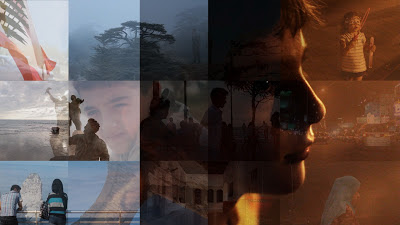 |
| Khaney Pictures Runtime: 1 hour, 17 minutes Rated: No MPAA rating Director: Christopher Sakr Writer: Christopher Sakr Narrators: Michael Elie-Layoun, Nour Petra-Hamieh, Eva Bekahi Documentary |
LIGHT gives us the perspective of Christopher Sakr, a boy who in 1987 left his home in Beirut to come to America. In 2011, he went back. The experience of seeing what Lebanon has become brings us this presentation.
“I fell in love,” writes Sakr. “My heart was broken. I fell in love again. This is what I saw, with the voices of others who - like me - left home long ago.” With three narrators (Michael Elie-Layoun, Nour Petra-Hamieh, Eva Bekahi) verbally overlaying what must have been a ton of captured footage of Lebanese mountains, elements, cities, animals, churches, and social gatherings (ad nauseam), the world of Lebanon is brought to us as a well-chosen series of artistically selected clips. These clips run non-stop throughout the film.
Through varying interludes of silence followed by the same ongoing barrage of scenery, we are gradually introduced to the subject of Lebanon’s future. The title of the film makes reference to the penetrating properties of light as they relate to finding light within oneself as opposed to without. I’m down with that, but am a bit confused as to why I’m hearing the analogy while seeing pictures of the sea and old trucks?
LIGHT is without the slightest doubt a great labor of love for its creator, but its challenges are twofold; the first issue, its problematic pacing; the second (and more damning), it’s handling of the subject matter.
Because of its somewhat excessive length and very spaced-out intervals of scenery with and without narrative, the viewing becomes tiresome and has trouble engaging. While having close to the same runtime as a general movie, it remains low on the amount of useful information it conveys.
With some exceptions, most documentaries aim to run a half hour since they aren’t like action movies where the time races by fast enough to make us lose track of it—no doubt this wasn’t the case within the mind of Sakr who lit up in reminiscence at seeing every pic. But it’s one thing to feel joy from something and quite another to transmit that joy to another person’s mind and make it their joy. That is why we do not expect to see people in general get watery-eyed while looking at our personal photo albums.
And then there is the subject matter. Problems such as the desire to imitate the United States, a change in (a lack of) neighborly attitudes, and a growing rampant materialism compose the bulk of the rhetoric. We get firsthand accounts from people who know Lebanon and have seen it change, but we get no expert testimony, no statistics, no authority figures speaking out on the seriousness of the issues, no sense of impending drama, and no in-depth analysis.
“There is so much history in this land,” we are told. Well, how about at least a summary of just the highlights for viewers who may need a brushing up of that history? We get none, just a passing reference to the old Ataman Empire and the dangers of what happens when religious fundamentalism overtakes the brotherly love it was intended to make way for.
And an inordinate reliance on technology, a dying middle-class, and of course, the lack of a sustainable economy are not by any means new to the discussion of what needs to change in any growing society—not just Lebanon. But outside of suggesting we be open to “discuss” change, there are no real solutions proposed.
Any emotion that the film tries to draw out ends up feeling forced with reliance on artful images and reflections back to “the good ‘ole days” as its driving force. It must be remembered that a documentary has the same responsibility to justify its viewing as does any other picture. -no grade-



Comments
Post a Comment